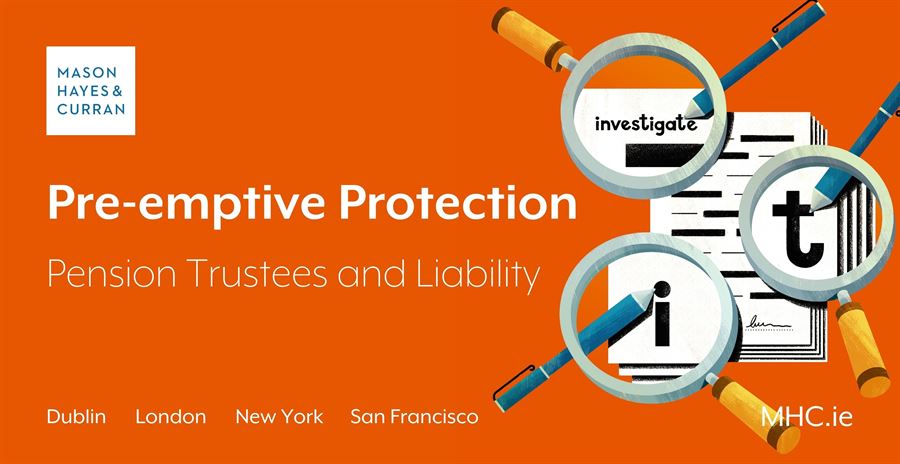
As the pensions industry gradually becomes more heavily regulated, there is no question that trustees face an environment that is rife with liability risk. In these circumstances, steps should be taken to ensure that trustees have the necessary safeguards in place to protect against personal liability. Some of the main protections that trustees should consider are:
-
Good governance:
-
Make certain that the scheme governing documentation is up to date from a legal and regulatory standpoint.
-
Ensure that all trustee decisions are well considered and properly minuted.
-
Exclusion and indemnity clauses in scheme governing documentation.
-
Pension trustee liability insurance.
-
The corporate veil.
Good governance
As a starting point, scheme governing documentation should be reviewed regularly to make certain that all references to legislation and regulations are up to date. This will ensure that trustees will not be misled at the outset by an out-of-date trust deed and rules.
Trustee training should be completed every two years as required, and trustees should be very well briefed on the full scope of their duties. All trustee decisions should be properly minuted and the rationale for any decisions taken should be clearly recorded. The courts are more likely to respect a trustee decision that is the subject of an action where it can be shown that an issue was properly considered and professional advice obtained.
Exclusion and indemnity clauses
A Trust deed will typically contain an exclusion clause for trustees. An exclusion clause will provide a useful form of protection from personal liability. Where trustees aim to rely on these clauses, they must take legal advice on the precise scope of the exclusions contained in it. This is because there are limits to what can and cannot be covered in these provisions. For instance, it would be normal for an exemption clause to exclude fraud or negligence.
A trust deed is also likely to contain indemnity protection for trustees. The indemnity may provide that the employer or the scheme will cover any costs or damages arising from a successful claim against the trustees. However, it should be noted that an indemnity is only beneficial where the employer or the scheme has the necessary assets to meet the costs or damages awarded. An indemnity will inevitably exclude instances of trustee negligence or fraud as well.
Pension trustee liability insurance
Trustees can also consider pension trustee liability insurance. It would be typical for a scheme’s governing documentation to contain a provision that permits trustees to put insurance in place for their own benefit. It would also be normal for an insurance clause to permit premiums to be paid from scheme assets. When this kind of policy is put in place, trustees should make sure that they understand the extent of the cover and the liabilities that will be met by the policy. It would be usual for trustee liability insurance to cover litigation defence costs and any damages awarded on foot of a successful claim against the trustees. The market for trustee liability insurance evolves in line with the requirements of trustees and employers, so before a policy is renewed, trustees should investigate the market and possibly seek advice to ensure that the best possible terms are obtained.
The corporate veil
The transposition of the IORP II Directive into Irish law means that trustees of all schemes must meet a set of fitness and probity requirements as well as have a sufficient level of expertise and knowledge. It is expected that this will lead to a greater prevalence of professional trustee boards as lay trustees (typically employees of sponsoring employers that sits on the trustee board) may struggle to meet the new regulatory requirements.
Most professional trustees provide their services through trustee companies where the board of the company act as the trustee board of the relevant scheme. Companies have separate legal personality from their directors and shareholders. This distinction between an organisation and its owners and officers is often referred to as the “corporate veil”. As a consequence of this, company directors have greater protection when it comes to personal liability as compared to individuals acting as trustees in their personal capacity. Most claims in these circumstances will be against the corporate trustee instead of the directors themselves. The assets available to cover costs or damages awarded will be limited to the company’s share capital. Where a claim is made, the pension scheme rules should also be checked to decide whether any protections provided to individual trustees also apply to the directors of a corporate trustee.
Conclusion
The starting point for trustees should be to ensure that good scheme governance is maintained and that all legal and regulatory requirements are met. Where trustees can show that this has been done then the risk of a successful claim will be significantly reduced. However, the protections available should be considered by all trustee boards and professional advice sought to ensure that all bases are covered.
If you would like to discuss the types of protections available to trustees, contact a member of our pensions team.
The content of this article is provided for information purposes only and does not constitute legal or other advice






